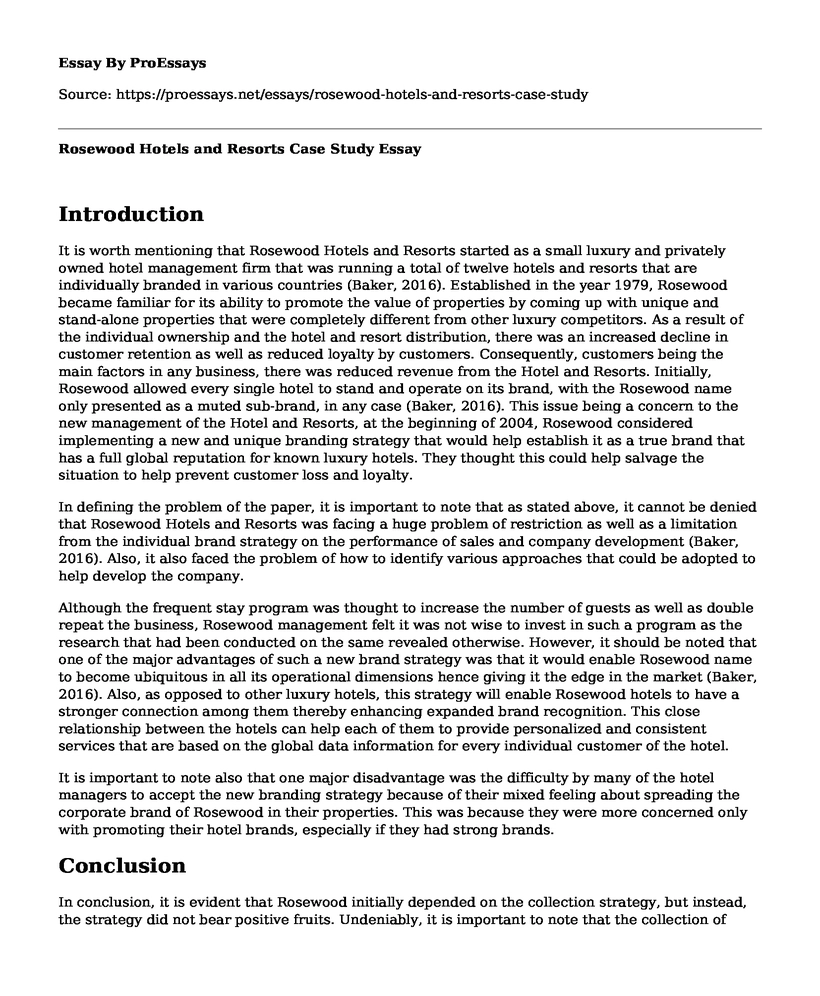Introduction
It is worth mentioning that Rosewood Hotels and Resorts started as a small luxury and privately owned hotel management firm that was running a total of twelve hotels and resorts that are individually branded in various countries (Baker, 2016). Established in the year 1979, Rosewood became familiar for its ability to promote the value of properties by coming up with unique and stand-alone properties that were completely different from other luxury competitors. As a result of the individual ownership and the hotel and resort distribution, there was an increased decline in customer retention as well as reduced loyalty by customers. Consequently, customers being the main factors in any business, there was reduced revenue from the Hotel and Resorts. Initially, Rosewood allowed every single hotel to stand and operate on its brand, with the Rosewood name only presented as a muted sub-brand, in any case (Baker, 2016). This issue being a concern to the new management of the Hotel and Resorts, at the beginning of 2004, Rosewood considered implementing a new and unique branding strategy that would help establish it as a true brand that has a full global reputation for known luxury hotels. They thought this could help salvage the situation to help prevent customer loss and loyalty.
In defining the problem of the paper, it is important to note that as stated above, it cannot be denied that Rosewood Hotels and Resorts was facing a huge problem of restriction as well as a limitation from the individual brand strategy on the performance of sales and company development (Baker, 2016). Also, it also faced the problem of how to identify various approaches that could be adopted to help develop the company.
Although the frequent stay program was thought to increase the number of guests as well as double repeat the business, Rosewood management felt it was not wise to invest in such a program as the research that had been conducted on the same revealed otherwise. However, it should be noted that one of the major advantages of such a new brand strategy was that it would enable Rosewood name to become ubiquitous in all its operational dimensions hence giving it the edge in the market (Baker, 2016). Also, as opposed to other luxury hotels, this strategy will enable Rosewood hotels to have a stronger connection among them thereby enhancing expanded brand recognition. This close relationship between the hotels can help each of them to provide personalized and consistent services that are based on the global data information for every individual customer of the hotel.
It is important to note also that one major disadvantage was the difficulty by many of the hotel managers to accept the new branding strategy because of their mixed feeling about spreading the corporate brand of Rosewood in their properties. This was because they were more concerned only with promoting their hotel brands, especially if they had strong brands.
Conclusion
In conclusion, it is evident that Rosewood initially depended on the collection strategy, but instead, the strategy did not bear positive fruits. Undeniably, it is important to note that the collection of unique properties help to distinguish Rosewood from its possible competitors. As a result, the Rosewood Hotels and Resorts is looking for a strategy that would enable them to expose its corporate brand, hence avoiding losing profits as well as increase its rate of cross-selling without necessarily undercutting too much on the special characters of each hotel under Rosewood.
References
Baker, M. A. (2016). Managing customer experiences in hotel chains. The Routledge handbook of hotel chain management, 240-250.
Cite this page
Rosewood Hotels and Resorts Case Study. (2022, Dec 14). Retrieved from https://proessays.net/essays/rosewood-hotels-and-resorts-case-study
If you are the original author of this essay and no longer wish to have it published on the ProEssays website, please click below to request its removal:
- Unilateral Rights and Exceptional Circumstances: Asda vs. Bateman Case Study
- Essay Example on Corporate Personhood: Legal Notion of Separate Entity
- Essay Example on Foodservice Management: Job Opportunities in Higher Ed
- Paper Example on a Detailed Explanation of Applying Theories of Corruption in a Group Podcast
- Essay Example on COVID-19 Impacts: Hospitality Industry Hit Hardest by Pandemic
- Essay Example on Small Businesses: Take it Online for a Broader Market Reach
- Paper Example on Good Ethics Leads to Good Business: Leaders Set the Tone







